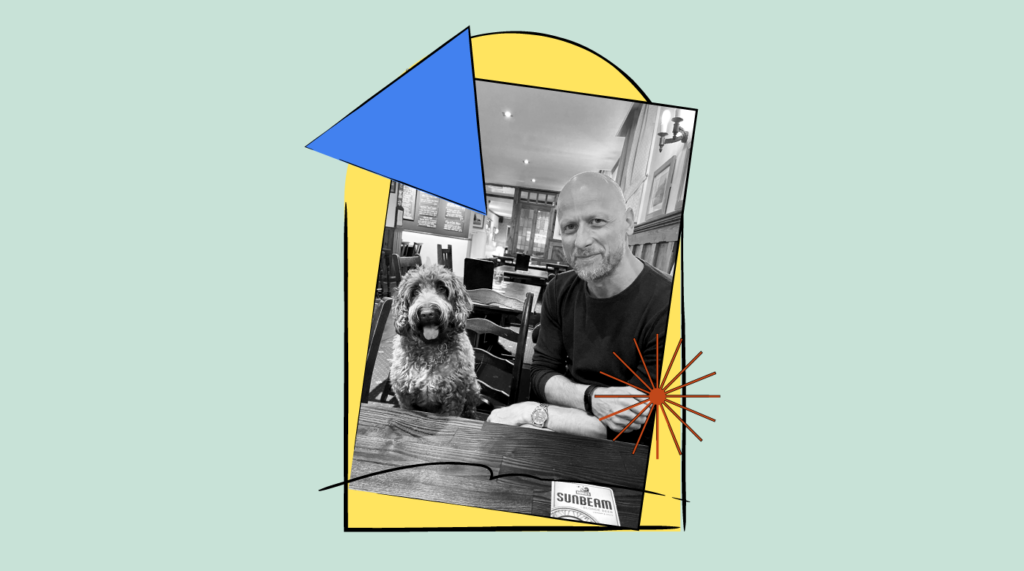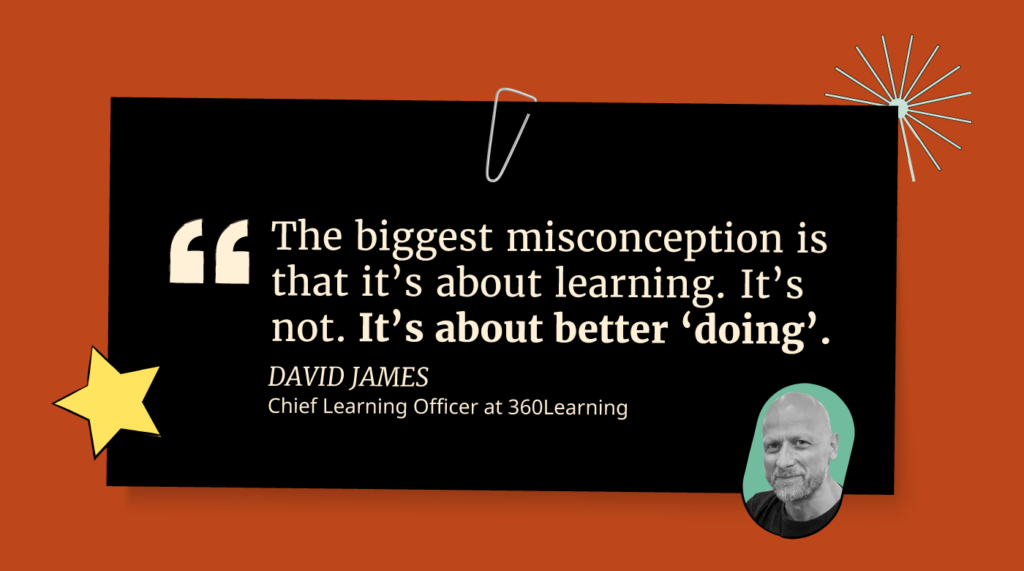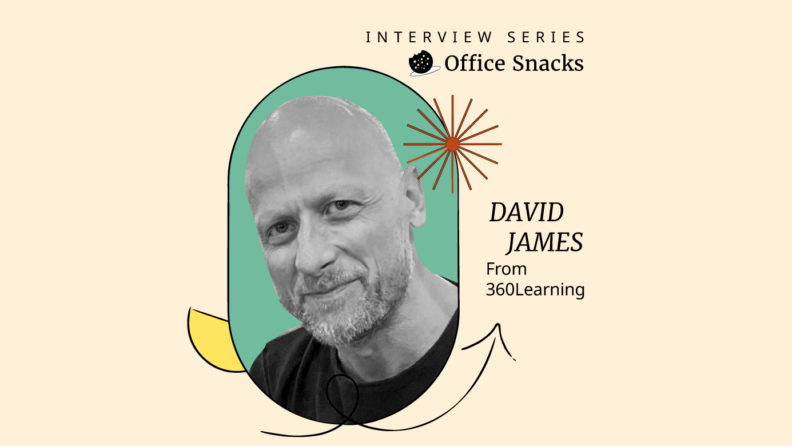In our Office Snacks series we interview members of our community to delve into their varied buffets of experience and come away with juicy insights and ideas.
Hi David! We’d love to get to know you better, where are you based?
I’m based in West Sussex, quite close to Brighton in the UK.

How’d you get to where you are today?
I entered into Learning & Development in the late 1990s when it was still Training & Development. I went on a training course and couldn’t believe that what the trainer was doing was an actual job!
It became my mission to learn all I could about it, so I went to evening classes to get certificated and applied to training roles. This was while working in a contact centre for Lloyds Bank. I then moved into a standalone training role at NatWest Bank and eventually made my way to Disney, where my career really took off.
At Disney’s EMEA head office, I ran the UK Learning & Development team before taking over Learning, Talent & OD for the EMEA region.
I did that for a couple of years before seeing some learning tech that changed my life. When Ben Muzzell, one of the founders of Looop showed me the platform, I recognised then that I’d just seen the first piece of learning tech I would use for my own development.
That was quite a revelation, seeing as I’d been pushing elearning and learning management systems to reluctant audiences for over a decade and thought there was something wrong with them.
I then went from Looop’s biggest fan to its first employee. After 7 years, Looop was acquired by 360Learning.
What’s the best piece of advice you’ve ever received?
Wow! Just one piece of advice? I’ll take two, if that’s OK? I took a risk in 2006 to accept a role at Disney on a 3 month contract rather than a full time role and that worked out pretty well. I ended up staying 8 years and learning both the UK L&D team and then the wider EMEA team. Thank you Nicola Allen!
Building on my previous answer, Nick Bradley from the Scale Up podcast encouraged me to start my podcast and that has changed my life. So that would be some great advice.
How does your typical day look, do you have a set routine you stick to?
My role requires me to have an internal focus, working with many of the teams within 360Learning to help refine the product, use cases, marketing and other areas, as well as an external focus where I speak to the wider L&D community.
So whilst I don’t have a typical day, I will often find myself meeting with a broad range of colleagues alongside planning and recording podcast episodes, webinars, conference sessions, and writing articles that we initiate at 360Learning and being a guest speaker on others’ episodes and events.
Nobody ever got hired or promoted for what they learned or what they know.
How do you describe your job to others?
As I mentioned above, my role is internal and external facing, so I apply my experience in Learning & Development to solve real problems for my colleagues, customers and my broader network. I do this with conversations: one-to-one, one-to-a-few, one-to-many, and sometimes a few-to-many.
What’s your favorite part of your job?
I love having conversations with L&D leaders who are making an actual difference. This could be on my podcast (The Learning & Development Podcast) or other events.
When L&D professionals choose to do harder work for greater pay-off I’m in awe of them, and so having the chance to speak with them is the best part of my job.
What’s your biggest challenge?
The biggest challenge for me is the biggest challenge to the profession and that’s to keep going in the face of silly distractions.
When I hear of a new silver bullet tech ‘solution’, or nonsense approaches to learning, I may feel momentary disillusionment followed quickly by the gusto to go again and share more of the good stuff that I know works—along with many allies and influencers across the world.
What do you think is the biggest misconception around L&D?

The biggest misconception is that it’s about learning. It’s not. It’s about better ‘doing’. Nobody ever got hired or promoted for what they learned or what they know. It’s what we do that gets results and so L&D need to be much more focused on achieving better performance (doing) and the improved KPIs of doing so.
But too much L&D stops at the delivery and provision of stuff. Data and evidence-based practice will help us achieve this because it relies on us seeking data to validate and understand the impact of any problem to be solved and the lived experience (evidence) of those we seek to influence.
How do you approach L&D in your organization?
At 360Learning, we place a great deal of emphasis on upskilling from within, which means helping employees to assimilate and grow based on what their successful colleagues know and do.
We believe that our culture—like any culture—has a major impact on peoples’ ability to perform, and so L&D links culture and technical development with bespoke resources and regular conversations. All aimed at addressing core employee concerns and organisational priorities.
How has technology impacted L&D?
Technology has been misapplied in L&D because for too long it’s been used to scale what L&D deliver.
Elearning that is universally loathed; LMS that are actively resisted; and virtual classrooms that achieve nothing but wasting time. The problem is that the buyer is not the user, so L&D teams buy all these new and novel ways of delivering content without knowing what the end-user is trying to achieve or what help they need.
This is why so much money is wasted on content libraries that nearly nobody uses. If the end-user was in charge, then they’d be seeking tech support to help them more specifically as they need it in the context of their working day.
The future of learning tech is getting closer to actual points of need and friction and guiding and supporting employees to the actual work they’re doing.
Which are your most-loved tools that help you with your job?
Google is my favourite tool for finding out and helping me to do things I wouldn’t be able to do otherwise. Alongside that, my iPhone and iPad for convenience. I also really value LinkedIn and Twitter for connecting and conversing with many people I admire in Learning and Development and being inspired by new people and ideas.
What’s been your most successful initiative to date and why?
The Learning & Development Podcast. I started it to have the conversations I wanted hear, in a podcast with people who are making a planned and demonstrable difference in their L&D, but it’s gone on to inspire others.
I’ve had guests on who’ve told me they’d adapted their approach following conversations I’d published, and they themselves are not making a planned and demonstrable difference in their organisations and reaping the rewards.
My number one piece advice of advice for L&D is to always aim directly to affect performance (how the work is actually done).
What do you think is the biggest challenge companies face in the current labour market?
Finding, upskilling, reskilling and keeping talented people. The deal between employers and employees is constantly changing and good people are hard to find and harder to keep, if you’re not giving them what they expect.
When you do hire the best people they expect to fulfill their potential and will go elsewhere if this isn’t realised. To benefit from hiring the best people, companies need to invest in actual capability development rather than delivering programs and providing content.
What’s your number one piece of advice for companies starting out with L&D?
My number one piece advice of advice for L&D is to always aim directly to affect performance (how the work is actually done).
Too much L&D is aimed at affecting ‘learning’ with neither an understanding of the work context they seek to affect or the actual friction experienced by the employees we seek to influence.
Without this information, L&D will inevitably waste money, time and credibility. The only way to predictably affect performance is to understand the current status of the same performance and what employees are trying to to and not able to do easily or effectively.
Those who are performance-oriented don’t wonder if they’re making an impact. They know they are and are able to objectively demonstrate that impact to stakeholders.
Lastly, and most importantly, what’s your favourite office snack?
My favourite snack is Mini Cheddars and I’ll eat them at the office, at home and on the go.
What’s your favorite office snack?
Work in People and Culture? Want to share your ideas?
Applications to be interviewed are open to anyone (yes anyone!) so don’t hesitate to fill in the form for an opportunity to share your knowledge and ideas.




